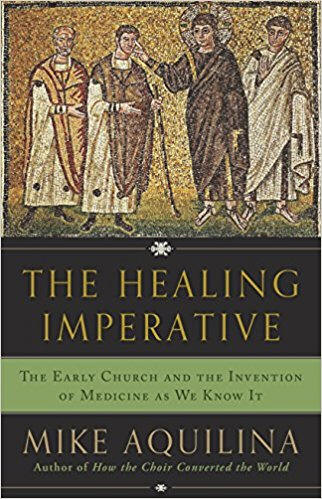Book Review
The Healing Imperative: The Early Church and the Invention of Medicine as We Know It
Mike Aquilina
Emmaus Road Publishing
 A
wonderful book. A real tonic especially to those of us who work in health
care. When was the last time we were proud of being both Catholic and in
health care when the mainstream media relentlessly condemn us for our lack
of support for certain "progresses" in medicine? As always with Aquilina,
the book is easy to grasp without being superficial.
A
wonderful book. A real tonic especially to those of us who work in health
care. When was the last time we were proud of being both Catholic and in
health care when the mainstream media relentlessly condemn us for our lack
of support for certain "progresses" in medicine? As always with Aquilina,
the book is easy to grasp without being superficial.
As we read this book, we cannot help but be both proud and grateful for our Catholic heritage. As the author says: "The hospital arose as a Christian institution utterly dependent on Christian principles". The seed planted by Christians was the "common ethos of charity". The brilliant minds of the classical world never came up with the hospital. It took Christianity to create the conditions under which modern medicine could develop.
When we examine the Old Testament, we are confronted with the idea of illness being a punishment for sin. The role of the physician is generally disregarded. The Israelites looked favorably towards the time of a Messiah who will be noted for his healing. So Jesus was able to proclaim: "The blind receive their sight, the lame walk, lepers are cleansed". In other verses, it is clear that Jesus does not attribute blame in cases of sickness. The physician and not the priest has the vocation to heal.
Unlike the pagans, Christians did not see the body as an encumbrance, a prison of the soul. The body as much as the soul is to be regarded as made in the image of God and needs to be treated with dignity. How different this vision is from that of Luther who regarded the body as utterly corrupt?
Given the nobility with which Christianity perceived the body, it is not surprising to learn that many of the early converts were physicians. The Christian doctor followed the Hippocratic tradition but he did not do certain things that his pagan contemporaries did. He absolutely did not do abortions or carry out infanticide. Nor would he prescribe contraceptives or assist in a suicide. He would not turn the poor away. Indeed, not taking care of the sick was a mark of a heretic, said Ignatius of Antioch. The Christian network of health and social care grew along with the Church. Remarkably for those days, care of the sick was regarded as a religious duty even in times of plague. Little wonder then that so many Christians in health care were themselves victims of the plague.Their patients were not only Christians but pagans as well.What an example of brotherly love this must have been for the pagans. That is how the early Christians converted their pagan brothers and sisters.
The author gives us wonderful examples of Christians who looked after the sick. St Basil was not only one of the greatest theologians but he built hostels for the homeless, orphanages and a famous hospital. It was a laywoman, Fabiola, student of St Jerome, who built the first hospital in Rome.
Thank you, Mike Aquilina for this uplifting work.
Reviewed by Dr Pravin Thevathasan
